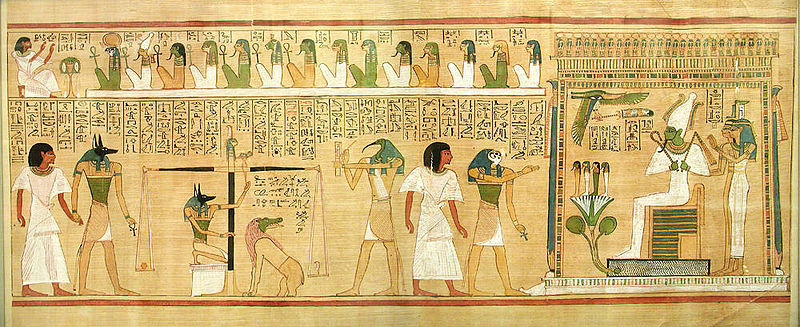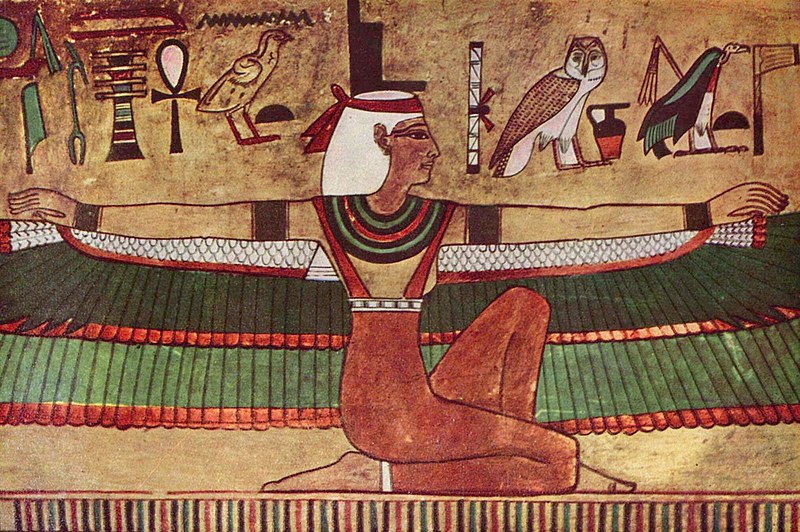.

A papyrus from the Book of the Dead in the Egyptian Archive of the British Museum tells the story of the scribe Hunefer in the waiting room of the afterlife: of how his fate hangs in the balance as his heart is weighed against a feather upon the scales of Maat, the scales of eternal justice, by the jackal-headed god Anubis.
Hunefer's heart resides, during this transitional period of judgment, inside the small pot on the scale tray to the left; on the scale tray to the right, we see the feather of Maat, or Rectitude. The emotional, intellectual and moral history of Hunefer has been distilled into the contents of the pot. There is no longer any chance of bargaining, negotiating or doing a deal. The finite game of mortal life, with all its little white lies perpetrated in the desperate attempt to keep the game going, is now over for the scribe; the game of infinity, with its very different set of rules, has begun.

Anubis leads Hunefer by the hand into the zone of judgment, and oversees the weighing; the drama is all in the moment for Hunefer, as Ammit the Devourer, also known as the Bone-Eater, not a goddess but more like a terminal custodian of justice, her features a composite of those creatures most feared, the dog, the crocodile, the hippopotamus, crouches beneath the scales, ready to scarf up the heart of Hunefer should the faintest trace of wickedness, a blemish greater than a feather's weight, be found.
As this supreme test takes place, ibis-headed Thoth, clerk of the gods, waits to record the result in the eternal annals.
In the next panel the scribe, should he pass the test, is to be presented by the hawk-god god Horus to the shrine of his father Osiris, the green-skinned god of the dead, and of the latter's divine sisters Isis and Nephthys.

Above the scene, in precise order of rank, sit in judgment the fourteen presiding gods of Egypt; each of the first seven of whom holds an ankh, the loop-headed cross, trilateral hieroglyphic character of eternal life.
The moment is pregnant with meaning. If Hunefer fails the test, his remains will be swallowed up by the chimerical Ammit and he will be denied entry to the afterlife. He will be consigned to nonexistence for eternity.

The weighing of the heart of Hunefer by Anubis, before the Devourer Ammit: from the Egyptian Book of the Dead, 19th Dynasty, c. 1285 B.C. (British Museum, via National Geographic)
Details from the above (the scales, the shrine): photos by Lenka P, 2007
Goddess Isis: from the tomb of Seti I, Valley of the Kings at Thebes, 17th Dynasty, c. 1380-1335 B.C. (Karnak Museum via the Yorck Project)
Hay man, I'm digging all these historical posts and historically related poems (from Keats to the Egyptian Book of the Dead! some spectrum brother). I feel like I'm learning and relearning some important lessons, both poetic and concerning the poetic. Keep up the great work.
ReplyDeleteThanks Mike, good to have someone to dig past and present with.
ReplyDeleteGuess it's obvious that this one supplied a small parable of the plight of the writer who dares autobiography.
I was given pause by the the fact that the scribe who is the subject of the suspenseful action also happens to be the same fellow who authored the papyrus, so that, when, in the final top panel, we see the fortunate Hunefer seated in grateful adoration of the supreme court of important deities, we know he has allowed himself to have passed the heart-weighing test.
But something tells me small growling noises may continue to be emitted from the vicinity of Ammit the Bone Eater.
Sometimes it's the questions the scribe asks that hold the weight of truth, not the answers. He (and it's usually a he) who writes the codex/history/gospel doesn't usually check his ego/ambition/politics at the door. (I will refrain from any related rude jokes about happy endings.)However, it could be that Hunefer is writing a wish as a means of making his heart's desires manifest, seeking to work a kind of magic influence upon fate. But I have been reading fellow KALX alum Frank Portman's Andromeda Klein, with an occultist heroine...and I have kissed the Blarney Stone in this life.
ReplyDeleteAnd The ( ii's) Have It..
DeleteThanks For The Magic Annie..
Lady Justice Has Her Moments!
Annie,
ReplyDeleteYes, to throw caution to the winds and indulge in some totally ahistorical projection, I too think Hunefer may well have been intending this papyrus as a sort of charm. But as to whether in the end it actually "worked like a charm" for him, producing eternal life and infinite ankh-ing forever, that pretty much remains to be seen.
been reading you for a time and enjoying immensely; the recent commentaries are so soft and bewitching... allegory and semiotic in an intertwined and effective tension... lovely re-discoverings...
ReplyDeleteHarlequin,
ReplyDeleteThanks very much for visiting my underworld, and I have been visiting your camp. Getting to know your landscape a bit. Must tell you that I was greatly impressed by being wrong in your fib contest, I had picked #2. Now that I know the answer I can relate to you that while I may be able to match you fracture for fracture, you would certainly destroy me in the bench pressing unless you are as light as a fairy. Possibly even then.
120 lbs, give or take.... am a bit lighter right now...but NOT light as a fairy.
ReplyDeletethanks for the response...
I quite enjoy your work here.
I have always felt captivated by the culture of Ancient Egypt. I remember getting lost in time at the Egyptology area in the Louvre and being amazed at the sight of "The Rosetta Stone" at the British Museum.
ReplyDeleteI had a similar experience with your post. The story teems with mystery and mythology and your words transmit the power of Egyptian beliefs in a very inviting way.
I always find that Anubis isn't frightening, though with our modern horror of death we should find him so.. there's something very clean-cut and calm about all the images of him, and when you see him supervising the weighing, this makes more sense: a god of balance and judgment. Ammit, on the other hand, is just a nasty bit of work, so we must hope to be weighed in the balance and not found wanting.
ReplyDeleteI'm sure you're right that Hunefer is doing some 'positive visualisation' here!
Harlequin,
ReplyDeleteWell, unless you're "all heart" (as the saying goes), it sounds as though you will do quite well in the Weighing ceremony.
Zeph,
Agree about Anubis. I suppose it's only natural that an animal whose natural behaviour is to "attend upon the dead" (so to speak) would be given that role in mythology. Embalming and mummification plainly being high arts to the Egyptians. Obviously his probity and impartiality are completely trusted, nobody seems to have accused him of taking a little something under the table to tip the scales in the Heart Weighing ceremony. As to Ammit, I suppose it's one of those jobs which, as they say, somebody has to do.
Here's a right sharp Best-in-Show Anubis:
Anubis
Lucy,
Thanks very much, I too am drawn to the mystery. And I find this particular story of the writer who has a chance to write his own life script -- but of course no control over what the audience response will be -- strangely compelling, in a timeless sort of way.
Thanks for this terrific piece. I like the detail of Osiris' green skin among so much else here.
ReplyDelete